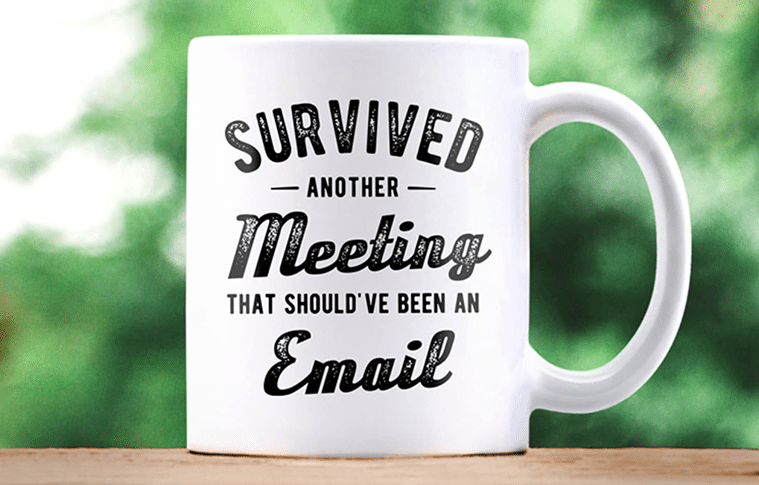Next time you are paging through the 17th message in a thread, consider that sometimes, meetings are the right tool for the job.

Table of contents
POV: You’re sitting in a meeting. Several people gathered around a table, one or two more on the phone. There is no agenda. The group is talking in circles. It’s not clear how or when this meeting will ever actually end because it wasn’t clear why you met in the first place. After some exorbitant amount of wasted time, the group lands on agreement about an absurdly benign and inconsequential issue.
That Meeting Should’ve Been an Email
We’ve pretty much all lived this meme. We ruefully chuckle when we see the mugs or mousepads emblazoned with those words.

After several years of internalizing that not only could we conduct a fair portion of our business remotely, we’ve also absorbed that a lot of issues could not be dispensed with in an email or Teams thread.
A win for Darwin. Evidence of adaptation.
POV 2: You’re sitting in front of your laptop. You are looking through an email conversation involving several people, with others being looped in as the messages progress. There are nine, 10, 11 messages on the topic. The messages are getting long. The subject lines start to look like:
Subject: Re: Re: Re: Re: Re: Re: Re: Re: Re: Re: Re: Re: Re: Client issue
We have so deeply internalized the efficacy of digital communication and abhorrence of meetings that require syncing time and space that we have Fonzi’d right over the shark.
This Email Probably Should Have Been a Meeting
I don’t say this lightly. I used to work in a bar association. I’ve been to more meandering, agenda-less meetings than the Geneva Convention should probably allow.
But … sometimes you find yourself 11 messages deep in an email thread and you just know. The lightning-shaped scar on your forehead throbs, and you know this email probably should have just been a meeting.
How Do You Know It’s Time to Call a Meeting?
In 2024, where we have leaned into remote work and asynchronous communications (and trust me, nobody likes those two trends more than me), how do we spot when an issue that is spooling up to consume reams of digital ink in your Outlook messages should be side-barred off into an actual meeting?
And which topics in firm management should presumptively involve the time, expense and hassle of meetings?
Here’s How You Know
When Email Messages Keep Getting Longer
The first sign you are stuck in an email thread that should’ve been a meeting is the length of the message you are reading. In general, if the message is longer than can be read without scrolling on an average laptop, consider that a warning. If the email has headings that are formatted with italics or bold, consider that a second, more serious warning.
If you receive an email in the chain that is so long that the author has inserted a TLDR summary at the top, it is time to make for the lifeboats.
Lawyers everywhere have just shifted uncomfortably in their Aeron chairs. Writing long, dense, incomprehensible stuff for money is what we do.
I get it. I also like writing long, dense, incomprehensible stuff. See also, everything on this website with my name next to it. I was an English major. I like reading. I mean, I read “Jude the Obscure.” And “Bleak House.” Well, some of it. Well, I meant to read it.
It’s nothing personal, and it’s certainly no reflection on your writing. It’s just that email is not the medium for unpacking complex, dense stuff.
Emails are read under different conditions, sometimes on tiny screens. (Ever seen anyone scroll through an email and read it on an Apple Watch? It’s like you have just found yourself in a Spike Jonze movie.) Or when they are … indisposed. They’re generally not settling down in front of a fire with a cognac and reading your email before paging through some classic Brandeis decisions or whatever.
When Email Chains Are Longer Than Seven Emails
A message chain has a natural lifecycle. It should have a beginning in which the issue is set and the relevant people are looped in. It needs a middle, where the competing issues and views are set forth. And it should not be longer than the career of, say, Smash Mouth.
From my perspective, the over/under on this is seven messages. Alternatively, an argument can be made for imposing a hard limit any time any person on the chain has responded three separate times. In any case, the point is that email threads are good for dispensing with relatively constrained, discrete topics.
If the thread has mushroomed past seven messages or multiple replies, it’s time to bring it in for a meeting.
Emails Involving High-Value Processes
Most of our conversations over email, even the ones that are designed to drive a group to a decision, are about relatively low-value issues. You can define low value by dollar amounts, category or any other way that fits your firm culture. Basically, if getting the result wrong is not something that will keep you up at night, it can safely be handled over email. Like, from which restaurant to bring in lunch for the mediation next week. It might annoy you if you end up eating a baked potato with “fixins” (I know it would annoy me), but that annoyance is probably not going to endure past dinner.
On the other hand, some decisions are high-value ones where arriving at the wrong result will be a total fiasco. Personally, I put hiring badly at the very top of that list. It’s something I’ve gotten wrong several times and has never failed to be an expensive, long-lasting and incredibly frustrating debacle.
Other things in that category are technology decisions like choosing a practice management software program; you will probably not choose one more than once every bunch of years, so you will live with the consequences of a bad decision for a while. (NB: Unlike hiring badly, at least you don’t have to go to lunch with the practice management software on its birthday.)
You know how to identify the high-value decisions and processes in your firm. When you spot one of these rushing headlong to an email decision, just be disciplined enough to take the time and set a meeting with key stakeholders. Make sure you give it every chance to be a good, long-term decision.
Mentoring and Coaching
One of the most important things you do in your firm is mentor and coach junior attorneys and other staff members to improve performance. It’s funny because these activities are the quintessential “important but not urgent” activities. So, they often get short shrift, as my mom used to say. But they are among the most important and long-lasting effects you will have on the growth and future of your firm. (Weird aside: Did you know that the important-urgent thing is credited to Eisenhower? It took a five-star general to come up with that?)
Next time you want to provide a bit of coaching — and I hope your coaching involves catching your folks doing all kinds of great things in addition to areas that need improvement — you may be tempted to pop your bit of wisdom in an email. But the value of coaching comes by seeing how it is received and making sure that the recipient is taking away the message you intend to send. Don’t trust that process to the vagaries of a dashed-off email read hastily in the middle of a grocery run.
That email needs to be a meeting.
All Professional Activities That Involve Persuasion
Wherever you employ your persuasion skills in your practice — from coaching employees to advising clients to negotiating with opposing counsel to informing arbitrators and so on — those skills are never going to be more impactful in email than they are synchronously and, most likely, in person. If there is ever a time to stop typing an email and queue up a meeting, it’s when you have a point that needs to be made, and you need all your powers to make sure it is heard.
Make It a Meeting
People who have worked with me would be, I think, a bit surprised by this article. Over the years, I’ve developed a subspecialty (which sounds so much nicer than a syndrome) of writhing in agony about extraneous meetings. But there is no getting around it; sometimes, they are the right tool for the job.
So next time you are paging through the 17th message in a thread and contemplating the virtues of monastic life, roll the clock back a bit before you reply and see if that email would be better off as a meeting.
Recent “Managing Up” Articles
“Law Firm Ecosystem: Location Neutrality”
“Law Firm Ecosystem: Compensation Systems”
“Law Firm Ecosystem: Recruiting Your Team”
“What Got You Here Won’t Get You There: Tools for Law Firm Growth”
“Increasing Your Legal Fees: A Four-Step Approach”
Image © iStockPhoto.com.

Sign up for Attorney at Work’s daily practice tips newsletter here and subscribe to our podcast, Attorney at Work Today.
















